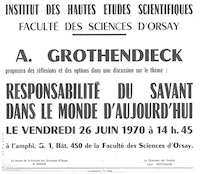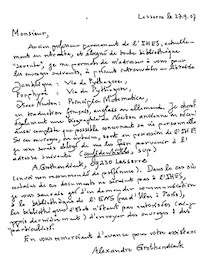The scientific heritage of IHES
1928: born in Berlin. His mother, Hanka Grothendieck, and his father, Sacha Schapiro, both supported the freedom movement and left their country to take part in the Spanish Civil War of 1934. Alexander Grothendieck remained stateless until 1971, when he became a French citizen.
1939 : Grothendieck, who had been entrusted to the Heydorn family, joined his parents in Paris. From 1942 to 1944, he lived with his mother in Chambon-sur-Lignon and attended the Collège Cévenol. His father was deported to Auschwitz, where he perished.
After the war, he moved to Montpellier with his mother and studied mathematics. His teachers sent him to Paris to meet Cartan, who directed him to Laurent Schwartz and Jean Dieudonné. From 1949, having moved to Nancy, Grothendieck prepared his doctorate on the tensorial topological projects of topological vector spaces. Three years later, his supervisors saw him as “the best specialist in topological vector space theory in the world”.


The renewal of algebraic geometry
Grothendieck spent the next few years at the CNRS, in Brazil and the United States, and changed his mathematical focus, turning to algebraic geometry. He laid the founding stones for algebraic geometry primarily during his twelve years at IHES, in dozens of seminars: "Séminaire de géométrie algébrique" (SGA), "Éléments de géométrie algébrique" (EGA) and in thousands of pages (drafting of SGA and EGA). Discussions with his many disciples went on for hours on end. In 1966, he was awarded the Fields medal in recognition of his work.
A radical environmentalist (1970-1972)

Grothendieck left the Institute in 1971, following a disagreement with Léon Motchane, and the discovery of financial support to IHES from the Ministry of Defense. For two years, he became involved with "Survivre et vivre", a radical environmental organization, in which he criticized and challenged scientific research.

Teaching in Montpellier
After two years spent at the Collège de France and one at Orsay University, Grothendieck became a professor at Montpellier University. There, he wrote long handwritten mathematical papers, as well as a thousand-page letter, Récoltes et semailles, réflexions sur un passé de mathématicien, intended for his former colleagues.

A hermit’s life, dedicated to meditation and writing
In 1990, he left without leaving a forwarding address and moved to Lasserre. Over the course of 24 years, he produced tens of thousands of handwritten pages, yet to be published, and looked after his garden. He passed away in November 2014.




